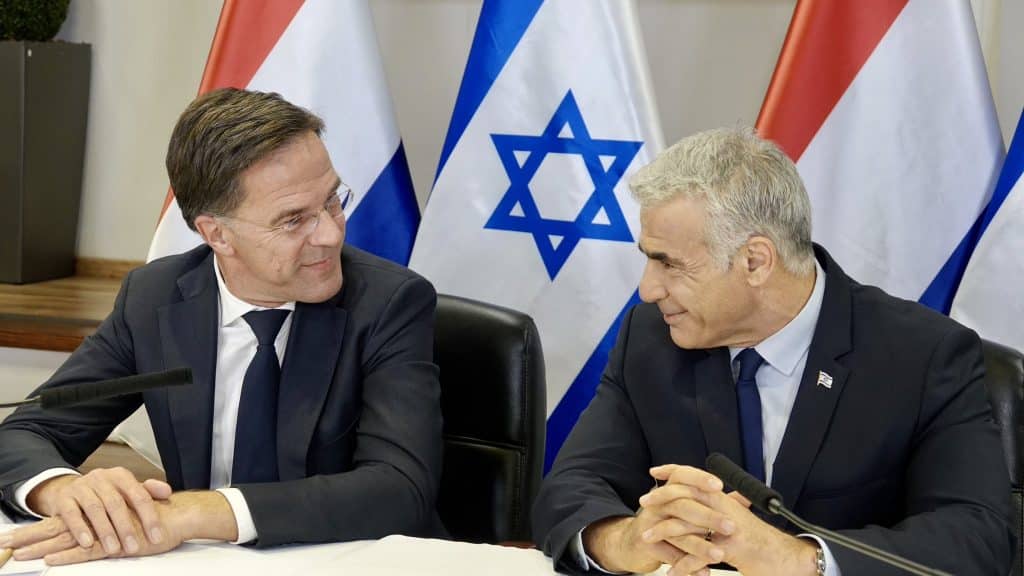Mark Rutte visited Israel and the occupied Palestinian territories last week, on Monday 24 and Tuesday 25 October. During his visit, the focus was on strengthening ties with Israel, Israeli business and the (relatively impotent) Palestinian Authority, while Palestinian human rights activists were skipped. A questionable programme at a time when the Israeli occupation of the Palestinian territories is hardening and Palestinian human rights organisations are under great pressure.
Meeting politicians and entrepreneurs
The first day of the visit was mainly dedicated to maintaining ties with Israel and the Israeli business community. Ruttes visit began with a lunch with CEOs of Israeli companies in the Netherlands and Dutch companies in Israel. This lunch was followed by talks with Israeli Prime Minister Yair Lapid and Defence Minister Benny Gantz. Afterwards, Rutte visited Holocaust survivors at a care home in Jerusalem. That evening, the prime minister spoke with Palestinian President Abbas.
The next day focused on Dutch relations with the Palestinian Authority. The prime minister had breakfast with two, unspecified, Palestinians "committed to a peaceful solution to the conflict". Rutte then visited Orange Corners in Ramallah in the occupied West Bank; a Dutch initiative to encourage young entrepreneurship. Finally, the Dutch prime minister spoke with opposition leader Benjamin Netanyahu, Israel's former prime minister. Netanyahu is a leading contender in the Israeli elections next month, despite the corruption investigation that is ongoing against him.
"Palestinian human rights organisations could not count on a visit from the prime minister."
Emphasis bands Israel
What is striking is that the emphasis of the visit is on strengthening ties with Israel, Israeli companies and the (relatively impotent) Palestinian Authority. By contrast, Palestinian human rights organisations, victims of heavy-handed Israeli repression, could not count on a visit from the prime minister. This gives the impression that Palestinian human rights are subordinate to Dutch trade interests in Israel. A bad signal, especially in a year when Israeli repression seems to be hardening. 2022 was the deadliest year for Palestinians killed at the hands of the Israeli army since 2015. One of more than 120 Palestinian civilian deaths this year at the hands of Israeli force was Al Jazeera journalist Shireen Abu Akleh. She was killed in an Israeli army raid on a Palestinian refugee camp, which she was reporting on.
Human rights organisations raid
In addition to intensified Israeli aggression, raids on seven Palestinian human rights organisations took place this summer. In the process, Israeli soldiers hammered the doors of the offices and declared the organisations closed "for security reasons". The organisations are among the most prominent Palestinian NGOs and received significant financial support from the United Nations and European member states. Six of the organisations were already labelled "terrorist groups" by Israel a year ago, accusations that the organisations themselves have denied. The United Nations and 10 European countries, including the Netherlands, also declared the accusations unfounded.
Illegal settlements
Another dubious issue during Rutte's visit was lunch with CEOs of Israeli companies. Human rights activists disclosed that some of the companies operate in illegal Israeli settlements in occupied Palestinian territory. For example, Netafilm, one of the Israeli companies Rutte spoke to, supplies irrigation systems to settlers in the West Bank. The Foreign Ministry's response was, "We know there are companies doing business in settlements. For this company, we now know this too. The Netherlands does not support this. But discouragement is not a boycott. We selected the companies for this network meeting on their value for the Dutch economy. They contribute to employment, innovation and a better climate."
"Rutte's meeting with CEOs of these companies appears to undermine own policies"
The choice to also invite these Israeli companies to the lunch is remarkable. For years, the Dutch government has had a policy of discouraging economic relations with companies trading in illegal Israeli settlements. Rutte's meeting with CEOs of these companies seems to undermine, or at least contradict, this policy.
"Human rights as a cornerstone"
The one-sided emphasis on maintaining good relations with Israel, at the expense of Palestinian human rights, is a continuation of a line that Rutte initiated last May in his response to the violence between Israel and Hamas at the time. Hamas fired rockets at Israel in response to rising tensions due to threats of evictions of Palestinians. The Israeli army responded with airstrikes. Rutte tweeted: "It is unacceptable that Hamas fires rockets indiscriminately at the civilian population. The Netherlands supports Israel's right to self-defence, within the limits of international law and proportionality." The one-sided focus on Israeli interests led to criticism from the House of Representatives. Rutte's most recent visit fits within this tendency to prioritise good ties with Israel over Palestinian human rights.
"If the cabinet really wants to put human rights at the centre of foreign policy, they should not be subordinated to Dutch trade interests."
This trend is worrying at a time when Palestinian human rights are under increasing pressure. In doing so, Rutte's most recent visit is inconsistent with the current cabinet's claim to have "human rights as the cornerstone of its foreign policy". If the cabinet really wants to put human rights at the centre of its foreign policy, one condition is that human rights are not made subordinate to Dutch trade interests. Welcoming Palestinian human rights activists - just when activism is made almost impossible for them - would be a step in the right direction.




